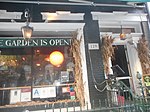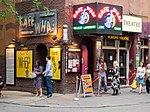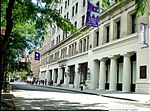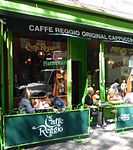Furman Center for Real Estate and Urban Policy
The Furman Center for Real Estate and Urban Policy is a joint center at New York University School of Law and the NYU Wagner School of Public Service. The Furman Center was established in 1995 to create a place where people interested in affordable housing and land use issues could turn to for factual, objective research and information. Since that time, the Furman Center has become an authority on such matters in New York City. The Furman Center has a three-part mission, including providing objective academic research about land use, real estate, housing and urban affairs, with a particular focus on New York City, promoting intense debate and productive discussion among elected, academic, and industry leaders, and presenting essential data and analysis about the state of New York City's housing and neighborhoods.
Excerpt from the Wikipedia article Furman Center for Real Estate and Urban Policy (License: CC BY-SA 3.0, Authors).Furman Center for Real Estate and Urban Policy
MacDougal Street, New York Manhattan
Geographical coordinates (GPS) Address Nearby Places Show on map
Geographical coordinates (GPS)
| Latitude | Longitude |
|---|---|
| N 40.730922 ° | E -73.999868 ° |
Address
Wilf Hall
MacDougal Street
10012 New York, Manhattan
New York, United States
Open on Google Maps










